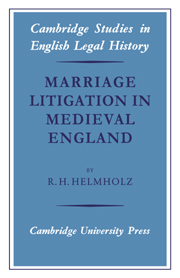Book contents
- Frontmatter
- Contents
- Dedication
- Preface
- Abbreviations
- Introduction
- I The sources
- II Suits to enforce marriage contracts
- III Suits for divorce and incidental marriage causes
- IV Procedure in marriage cases
- V Judges, lawyers, witnesses and litigants
- VI Changes and variations in practice
- Conclusion
- Appendix Extracts from marriage cases
- Bibliography
- Index
V - Judges, lawyers, witnesses and litigants
Published online by Cambridge University Press: 18 September 2009
- Frontmatter
- Contents
- Dedication
- Preface
- Abbreviations
- Introduction
- I The sources
- II Suits to enforce marriage contracts
- III Suits for divorce and incidental marriage causes
- IV Procedure in marriage cases
- V Judges, lawyers, witnesses and litigants
- VI Changes and variations in practice
- Conclusion
- Appendix Extracts from marriage cases
- Bibliography
- Index
Summary
A survey of even a restricted class of litigation requires some analysis of the people involved in the court system. Who were they? What training did they have? How well did they do their jobs? The information that can be discovered, it will be seen, is in no case complete. Nor is this the place for a full-scale study of the careers of court personnel, although such a study would be useful in its own right and would be, at least for some courts, entirely possible. Here we must be content with a discussion directed specifically at marriage litigation. It is artificial, of course, to separate marriage cases from other sorts of litigation in describing court personnel. But marriage law did have rules and problems of its own. Even though the conclusions must be tentative and incomplete, it would be wrong to omit any consideration of the people connected with this subject.
THE JUDGES
Correct decision of marriage cases required both training in the law and evident sound judgment in dealing with people. The variety of words used to contract marriage and the fine distinctions evolved by the canonists for evaluating them rendered the first of these necessary. The nature of the subject matter itself, which dealt with the difficult and personal problems of enforcing the bond of marriage, rendered the second equally imperative. The high requirements for judging marriage cases were, in fact, recognized by the canon law itself.
- Type
- Chapter
- Information
- Marriage Litigation in Medieval England , pp. 141 - 164Publisher: Cambridge University PressPrint publication year: 1975



